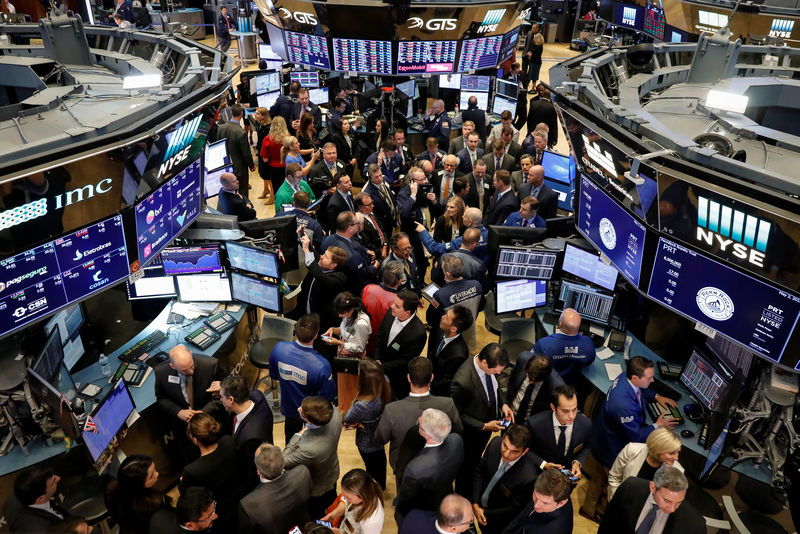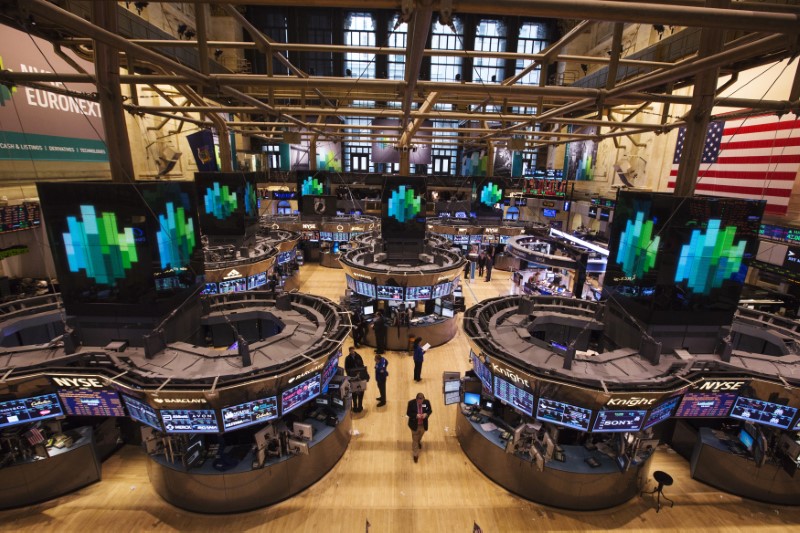By Stephen Culp
NEW YORK (Reuters) - Wall Street ended a choppy session slightly higher on Monday as weakness in defensive stocks offset optimism following U.S. President Donald Trump's conciliatory remarks toward China's ZTE Corp (HK:0763) that calmed the waters of U.S.-China trade tensions.
The S&P 500 (SPX) pared its gains after hitting a roughly two-month high earlier in the session, but at closing bell the index held onto its four-day winning streak.
Trump vowed on Sunday to help China-based communications firm ZTE (SZ:000063) "get back into business, fast" nearly a month after the Commerce Department implemented a ban on U.S. companies selling to the company.
Trump's reversal arrived on the cusp of high-level talks between the world's two largest economies, due to resume this week after back-and-forth rhetoric between the countries stoked fears that retaliatory tariffs could be imposed.
"Hopefully they can strike some deals that are amenable to both countries but also keep the economies on the rails and not force a trade war," said Chuck Carlson, chief executive officer at Horizon Investment Services in Hammond, Indiana.
The Dow Jones Industrial Average (DJI) rose 68.24 points, or 0.27 percent, to 24,899.41, the S&P 500 (SPX) gained 2.41 points, or 0.09 percent, to 2,730.13 and the Nasdaq Composite (IXIC) added 8.43 points, or 0.11 percent, to 7,411.32.
With 91 percent of S&P 500 companies having reported first-quarter results, earnings were on pace for a 26.1 percent increase, according to Thomson Reuters data.
"I think the issue is not so much are the earnings that are being reported today going to be good," Carlson said. "It's almost like: Are they going to be too good? Are they setting up difficult comparisons 12 months hence, and how is the market going to respond to that?"
Of the 11 major sectors in the S&P 500, defensive utilities (SPLRCU), telecoms (SPLRCL) and real estate <.SPLRCR> stocks were the biggest percentage losers.
Healthcare (SPXHC) stocks saw the largest gains after the Trump administration unveiled its drug price proposals.
Meanwhile, energy (SPNY) companies advanced as oil prices (CLc1) rose following an OPEC report that the global oil glut had been all but eliminated.
Smaller-sized U.S. stocks are outperforming the heavyweights; while the Russell 2000 (RUT) slipped 0.2 percent, earlier in the session it came within less than two points of its previous record high.
Gaming company stocks jumped as the U.S. Supreme Court paved the way for states to legalize sports betting. Casino and race track operator Penn National (O:PENN) posted a record high, last up 4.7 percent. Caesars Entertainment (O:CZR), and Madison Square Garden (N:MSG) gained 5.5 percent and 2.6 percent, respectively.
U.S. optical component maker stocks received a boost from the ZTE news, with Acacia Communications (O:ACIA) up 8.7 percent. Oclaro Inc (O:OCLR) and Lumentum Holdings Inc (O:LITE) advanced 2.9 percent and 2.2 percent, respectively.
Shares of defense contractors such as Raytheon (N:RTN), Lockheed Martin Corp (N:LMT) and Northrop Grumman Corp (N:NOC) weighed on the markets as investors pointed to easing geopolitical tensions.
Xerox Corp (N:XRX) shares slid 4.3 percent after abandoning a planned $6.1 billion deal with Fujifilm Holdings Corp (T:4901).
Shares of Viacom Inc (O:VIAB) dropped 4.9 percent after CBS Corp (N:CBS) sued to stop controlling shareholder Shari Redstone's planned merger with Viacom. CBS was up 2.0 percent.
Declining issues outnumbered advancing ones on the NYSE by a 1.12-to-1 ratio; on Nasdaq, a 1.19-to-1 ratio favored decliners.
The S&P 500 posted 24 new 52-week highs and 2 new lows; the Nasdaq Composite recorded 114 new highs and 34 new lows.
Volume on U.S. exchanges was 5.96 billion shares, compared to the 6.65 billion average for the full session over the last 20 trading days.

